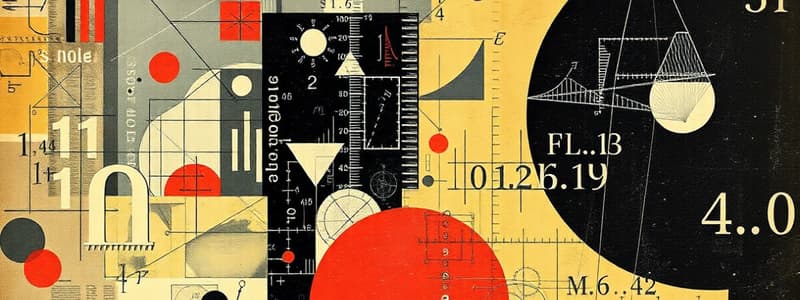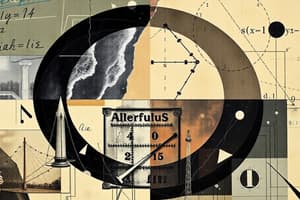Podcast
Questions and Answers
Which of the following concepts is NOT directly related to differential calculus?
Which of the following concepts is NOT directly related to differential calculus?
- Rates of change
- Areas under curves (correct)
- Derivatives
- Tangents to curves
What is a key characteristic of discrete mathematics that differentiates it from other branches of mathematics?
What is a key characteristic of discrete mathematics that differentiates it from other branches of mathematics?
- Focus on continuous structures and functions
- Study of sets, graphs, and trees (correct)
- Applications in social sciences and economics
- Emphasis on proving theorems using geometric methods
Which of the following is NOT a measure of central tendency commonly used in statistics?
Which of the following is NOT a measure of central tendency commonly used in statistics?
- Median
- Standard deviation (correct)
- Mode
- Mean
What is a primary application of probability in various fields?
What is a primary application of probability in various fields?
Which of these is a key characteristic of mathematical models?
Which of these is a key characteristic of mathematical models?
What is the main focus of arithmetic?
What is the main focus of arithmetic?
Which of the following is a key aspect of algebra?
Which of the following is a key aspect of algebra?
Which property allows the rearrangement of terms in an addition operation?
Which property allows the rearrangement of terms in an addition operation?
What is a crucial concept in computing areas and volumes of shapes in geometry?
What is a crucial concept in computing areas and volumes of shapes in geometry?
What field extensively uses trigonometry?
What field extensively uses trigonometry?
In calculus, what does differential calculus primarily focus on?
In calculus, what does differential calculus primarily focus on?
Which of the following is NOT a type of number system in arithmetic?
Which of the following is NOT a type of number system in arithmetic?
Which type of geometry involves the study of shapes in a flat, two-dimensional space?
Which type of geometry involves the study of shapes in a flat, two-dimensional space?
Flashcards
Differential Calculus
Differential Calculus
Focuses on rates of change, derivatives, and tangents to curves.
Integral Calculus
Integral Calculus
Deals with accumulation of quantities, anti-derivatives, and areas under curves.
Probability
Probability
Measures the likelihood of events occurring.
Measures of Central Tendency
Measures of Central Tendency
Signup and view all the flashcards
Discrete Mathematics
Discrete Mathematics
Signup and view all the flashcards
Mathematics
Mathematics
Signup and view all the flashcards
Branches of Mathematics
Branches of Mathematics
Signup and view all the flashcards
Arithmetic
Arithmetic
Signup and view all the flashcards
Order of Operations
Order of Operations
Signup and view all the flashcards
Algebra
Algebra
Signup and view all the flashcards
Geometry
Geometry
Signup and view all the flashcards
Trigonometry
Trigonometry
Signup and view all the flashcards
Calculus
Calculus
Signup and view all the flashcards
Study Notes
Fundamental Concepts
- Mathematics studies abstractions like quantity, structure, space, and change.
- It uses symbolic language for problem-solving.
- Key branches include arithmetic, algebra, geometry, trigonometry, calculus, and more.
- Mathematics models and understands the world, from nature to human systems.
- It provides a framework for logical reasoning and problem-solving.
Arithmetic
- Arithmetic focuses on basic operations: addition, subtraction, multiplication, and division.
- It includes factors, multiples, prime numbers, and integers.
- Number systems (natural, whole, rational, irrational, real, and complex) exist with their properties and operations.
- The order of operations (PEMDAS/BODMAS) is crucial for correct calculations.
- Properties like commutativity, associativity, and distributivity simplify calculations.
Algebra
- Algebra extends arithmetic using variables (letters) to represent unknowns.
- It involves solving equations and inequalities.
- Essential algebraic manipulations include simplifying expressions, combining like terms, factoring, and expanding brackets.
- Formulas and identities are helpful for problem-solving.
- Concepts like linear, quadratic, and polynomial equations are studied.
Geometry
- Geometry studies shapes, sizes, and properties of figures in space.
- It studies points, lines, planes, angles, triangles, quadrilaterals, circles, and polygons.
- Different geometries exist, including Euclidean, non-Euclidean, and coordinate geometry.
- Geometric proofs use deductive reasoning.
- Formulas for areas and volumes of shapes are important.
Trigonometry
- Trigonometry studies relationships between angles and sides of triangles.
- It's used in engineering, surveying, and navigation.
- Trigonometric functions (sine, cosine, tangent) describe angle-side relationships.
- Trigonometric identities and formulas are crucial for solving triangles.
- Applications include finding angles and distances in right-angled and oblique triangles.
Calculus
- Calculus deals with change and motion;
- It has two branches: differential and integral calculus.
- Differential calculus focuses on rates of change, derivatives, and tangents.
- Integral calculus deals with accumulation, anti-derivatives, and areas under curves.
- Applications include optimization problems and modelling natural phenomena.
Probability and Statistics
- Probability deals with the likelihood of events.
- Statistics involves collecting, analyzing, and interpreting data.
- These concepts are used in science, business, and social sciences.
- Probability distributions describe outcome likelihoods.
- Measures of central tendency (mean, median, mode) and spread (standard deviation, variance) are important descriptive statistics.
Discrete Mathematics
- Discrete mathematics studies non-continuous structures, including graphs, trees, and sets.
- It's applied to computing and engineering.
- Counting, logic, and graph theory are fundamental concepts.
- Techniques are needed to solve discrete problems.
Other Important Concepts
- Mathematical proofs prove theorems and explore relationships.
- Mathematical models represent real-world situations for understanding and solving problems.
- Mathematical reasoning involves using principles to arrive at logical conclusions.
Studying That Suits You
Use AI to generate personalized quizzes and flashcards to suit your learning preferences.





